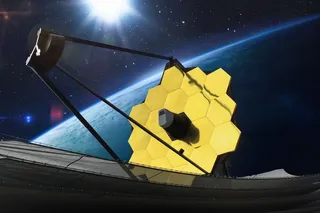http://www.youtube.com/watch?v=zBOFHnnD0m0&feature=player_embedded One private space company says it may claim a portion of the coveted Google Lunar X Prize in the near future--all it has to do is land a robot on the moon, travel roughly 1,640 feet, and then send data back to Earth. The company, Astrobotic Technology, announced this week that it's getting serious about the moon mission--it reserved a seat for its robot on SpaceX's Falcon 9 rocket. Currently scheduled to launch in December 2013, the rocket will shuttle the company's Red Rover to lunar orbit, where Astrobotic Technology hopes to complete the tasks set for it to claim $24 million of the $30 million prize. So far, this is how the itinerary should play out:
The Falcon 9 upper stage will sling Astrobotic on a four-day cruise to the Moon. Astrobotic will then orbit the moon to align for landing. The spacecraft will land softly, precisely and safely using technologies pioneered by Carnegie Mellon University for guiding autonomous cars. The rover will explore for three months, operate continuously during the lunar days, and hibernate through the lunar nights. The lander will sustain payload operations with generous power and communications. [SpaceRef]
SpaceX's leader, Elon Musk, knows that his rocket is not only up to this task of sending Astrobotic's spacecraft on its way, but also much more:
"Falcon 9 is capable of launching missions to the moon, Mars or beyond. Payload to the moon is about three tons and to Mars about two tons, meaning Falcon 9 could have launched the Spirit and Opportunity Mars rovers on a single flight," wrote Musk. [Discovery News]
The Google Lunar X Prize offers prize money based on the number of tasks a company achieves on the lunar surface: $20 million goes to the first group that lands a rover on the moon, but only if it happens before December 31, 2015. In addition, $4 million goes to that team if they can accomplish other tasks, including traversing more than three miles or finding water on the moon. While Astrobotic Technology sounds like the frontrunner right now, it's worth noting that the company had at one time scheduled its first mission for 2010 (it didn't happen). But if the company does meet its deadlines and sends the rover to the moon in 2013, the company swears that trip won't be their last:
"The mission is the first of a serial campaign," said Dr. William "Red" Whittaker, chairman of Astrobotic Technology and founder of the university's Field Robotics Center. "Astrobotic's missions will pursue new resources, deliver rich experiences, serve new customers and open new markets. Spurred further by incentives, contracts, and the Google Lunar X-Prize, this is a perfect storm for new exploration." [SpaceRef]
Related Content: 80beats: SpaceX Blasts Its Dragon Space Capsule Into Orbit (UPDATE: Splashdown Success) 80beats: SpaceX Gets First Commercial Permit to Make Orbital Round-Trips 80beats: Lunar X Prize Competitor Hopes to Send a Rover Back to Tranquility Base 80beats: Disappointing News: No Icy Patches in the Lunar Craters 80beats: New Race to the Moon Could Bring Permanent Bases and Observatories













